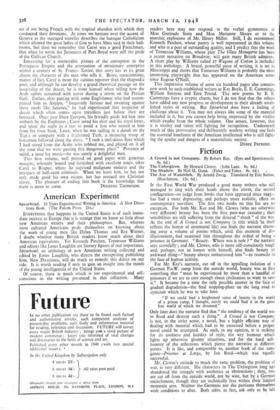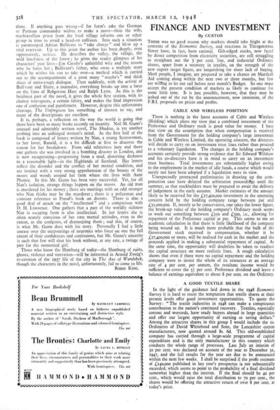Fiction
The Unforgiven. By Howard Clewes. (John Lane. 8s. 6d.)
IF the First World War produced a good many writers who still managed to sing with their heads above the storm, the second conflagration—to judge from books that have appeared since 1945— hai had a more depressing, and perhaps more realistic, effect on contemporary novelists. The first two books on this list are no exception. For both Mr. Kee and Mr. Clewes (who are otherwise very different) beauty has been the first poSt-war casualty ; their sensibilities are still suffering from the delayed " shock " of the war. At the end of A Crowd is not Company (a title which In itself reflects the horror of communal life) one finds the narrator throw- ing away a volume of poems which, until this moment of dis- illusionment, had sustained him throughout the ordeal of being a prisoner in Germany. "Beauty. Where was it now ? " the narrator says scornfully ; and Mr. Clewes, who is more self-consciously tough and, perhaps, not so honest with himself, alsO finds beauty an awkward thing—" beauty always embarrassed him "—to reconcile in the face of human activity.
For Mr. Kee's narrator, cut off in the appalling isolation of a German P.o.W. camp from the outside world, beauty was at first something that "must be experienced by more than a handful of prisoners if we are to care enough about civilisation to want to save it." It became for a time the only possible answer in the face of gradual degradation—the final stopping-place on the long road to cynicism which he was to take later.
" If we could find a heightened sense of beauty in the world of a prison camp, I thought, surely we could find it in the great free world of which we dreamed."
Only later does the narrator find that " the tendency of the world was to flood and destroy such a thing." A Crowd is not Company is not, in the strict sense, a novel, but a highly efficient way of dealing with material which had to be exorcised before, a proper novel could be attempted. As such, in my opinion, it is striking for its coolness and lucidity of style, the wry humour which lights up otherwise gloomy situations, and for the hard self- honesty of the reflections which pierce the narrative at different points. It is like, and comparable to, another book of the same genre—Prisoner at Large, by Ian Reed—which was equally successful.
Mr. Clewes's attitude to much the same problem, the problem of war, is very different. His characters in The Unforgiven long ago abandoned the struggle with aesthetics or abstractions ; they, too, are cut off from the outside world, not by wire, but by a German encirclement, though they are technically free within their limited mountain area. Neither the Germans nor the partisans themselves wish conditions to alter. Both sides. in fact, ask only to be left
alone. If anything goes wrong—if for form's sake the German or Partisan commander wishes to make a move—then the wily, machiavellian priest from the local village informs one or other group in time to avoid a head-on collision. Into such a situation is paratrooped Adrian Bullivant to " take charge " and blow up a vital reservoir. Up to this point the author has been ,deeply, even oppressively, serious. He describes the valley, the village, the wild loneliness of the forest ; he gives the reader glimpses of his characters' past lives—Jim Crosby's unfaithful wife and the reason why he hates her ; Bullivant's father, who owns a multiple store which he wishes his son to take over—a method which is carried. out to the accompaniment of a great many " maybe's " and thick slices of extra-tough dialogue. Then suddenly, with the arrival of Bullivant and Slater, a journalist, everything breaks up into a farce on the lines of Robertson Hare and Ralph Lynn. As this is the brightest part of the novel, it gives the whole first section, with its clumsy retrospects, a certain falsity, and makes the final impression one of confusion and puzzlement. However, despite this unfortunate cleavage, The Unforgiven has something of interest to say, and many of the descriptions are excellent. It is, perhaps, a reflection on the way the world is going that there have been so many books recently on insanity. Neil M. Gunn's unusual and admirably written novel, The Shadow, is yet another probing into an unhinged woman's mind. Ai the first half of the book is composed of letters written by Nan, a young Scotswoman, to her lover, Ranald, it is a bit difficult at first to discover the reason for her breakdown. From odd references here and there one gathers she was involved in a bombing disaster in London, and is now recuperating—progressing from a mad, distorting darkness to a reasonable light—in the Highlands of Scotland. Her letters reflect the disorder and the conflict of her mental condition, and are instinct with a very strong apprehension of the beauty of the moors and woods around her farm where she lives with Aunt Phemie. In this Mr. Gunn has been very successful. Yet, for all Nan's isolation, strange things happen on the moors. An old man is murdered for his money ; there are meetings with an odd stranger who Nan thinks may be the murderer ; there is a policeman and constant reference to Freud's book on dreams. There is also a good deal of attack on the " intellectual " and a comparison with D. H. Lawrence. One gathers that a part of the worldly sickness Nan is escaping from is also intellectual. In her letters she is often acutely conscious of her own mental attitudes, even to the extent, as she confesses, of dramatising theni ; and this, of course, is what Mr. Gunn does with his story. Personally I feel a little uneasy over the outpourings of neurotics who force on one the full extent of their confidences and confessions, but Mr. Gunn's sincerity is such that few will shut his book without, at any rate, a twinge of pity for the tormented girl. Those who know the Hamburg of today—the Hamburg of ruins, ghosts, violence and starvation—will be interested in Arnold Zweig's re-creation of the 1937 life of the city in The Axe of Wandsbek, though the characters in the novel, unfortunately, fail to come to life.
ROBIN KING.



































 Previous page
Previous page